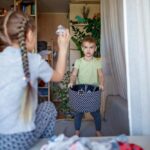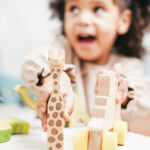Raising An Eco-Conscious Child: Lessons From My First Year As A Mom

Raising an eco-conscious child in today's world isn't an easy task. A first-year mom shares her insights and experiences that can help parents navigate this important topic.
Experts: Jeffrey Trawick-Smith | Dr. Pooja Tandon, MD, FAAP
There’s nothing better than watching your child take in something new—from their wide-eyed amazement at birds, or their intense concentration over a leaf, to their absolute fascination with the dirt they just tasted. It’s a reminder that the Earth is the best playground. And as I watch my son take in new experiences, one hope continues to grow: That he’ll feel a lifelong love and connection to our planet.
In my first year of motherhood, I’ve realized that sustainability needs to be a natural part of our everyday routines. Here are some simple habits I’ve embraced as I learn to live more mindfully with my little one.
Rent Instead of Buy
I knew I wanted to try a clothing rental service before my son was born. Babies grow at an astonishing rate, averaging nearly an inch each month for the first six months alone, so the thought of constantly buying new outfits seemed both wasteful and overwhelming.
I found UpChoose, a clothing rental service that’s been a game-changer for us. With UpChoose, I receive a rotating selection of high-quality, organic baby clothes I can swap out as he grows. This way, he’s dressed in durable, natural fabrics that I don’t have to worry about storing, reselling, or donating when they no longer fit.
The environmental benefits of clothing rental services like UpChoose are significant. The textile industry is one of the largest polluters in the world, accounting for around 10% of global carbon emissions and approximately 20% of wastewater production. By renting baby clothes instead of buying new ones, we help reduce demand for fast fashion, cutting down on waste and the resources needed to produce and dispose of garments.
This model doesn’t just ease the burden on my budget and the planet; it also gives me a sense of connection to a growing community of parents rethinking traditional shopping. By sharing clothing made to last, we’re helping foster a system where families work together to create a lighter footprint on the Earth—one onesie at a time.
Make Thoughtful Food Choices
When it was time for our son to start solids, I was determined not to let single-use plastics and questionable ingredients take over his diet. Instead of drastically changing what we eat, I’ve kept it simple: My son eats what we eat.
According to the World Economic Forum, the global food system is responsible for approximately 30% of global greenhouse gas emissions, making our food choices crucial for environmental sustainability. Feeding my son the same meals my partner and I eat—either blended for him or served as-is—saves time and helps us avoid food waste. Plus, since we’re vegetarian we are still keeping our carbon footprint to a minimum.
The ripple effect of these simple choices feels empowering. By embracing these habits, I’m nourishing my son and laying the foundation for him to understand food’s connection to health and sustainability. Just like with our approach to clothing, it feels rewarding to be part of a community of parents who are rethinking traditional norms and making mindful choices, one meal at a time.
Less Is More
Let’s talk toys. I quickly realized that my son didn’t need a flashing gadget to be entertained. He’s just as thrilled by our wooden spoons and empty milk cartons.
So, we took a “less is more” philosophy with toys, choosing high-quality, sustainably made options that our son could enjoy for years. Sure, we still have a few “flashier” toys around, but we’ve mostly bought toys made from wood or recycled materials that are eco-friendly.
Many toys we use are intentionally designed to support open-ended play, which nurtures creativity by allowing kids to explore without restrictions. Experts like Jeffrey Trawick-Smith, Professor of Early Childhood Education at Eastern Connecticut State University, advocate for simple toys: “Basic is better. The highest-scoring toys have been quite simple, like hardwood blocks, which allow children to use them in multiple ways.” Simpler toys encourage children’s imagination and problem-solving skills, helping them develop cognitive skills and independence without overstimulation.
Go Outside
My partner and I are committed to giving our son his daily dose of the outdoors, whether it’s a quick walk, long hike, or picnic in the park. Even though he doesn’t understand words like “photosynthesis” or “ecosystem,” he’s growing up knowing there is so much to learn and explore outside his front door. We’re teaching him that the world is beautiful, wild, and something to be cared for.
As Dr. Pooja Tandon, a pediatrician and advocate for outdoor play, notes, “Science supports what you may already know intuitively, that time outdoors, especially in nature, is important for the development and well-being of children.” Dr. Tandon emphasizes that outdoor experiences nurture a child’s mental health and help establish a lifelong relationship with the environment. She explains, “The more time a child spends in nature, the more likely they are to grow up to be good stewards of our planet.”
Monkey See, Monkey Do
Babies might not be able to articulate their thoughts yet, but they’re keen observers, soaking in every move we make. This means that every moment is an opportunity.
Research shows that children learn through imitation, and everyday actions like composting or repurposing jars may seem small, but it sets the stage for lasting habits. According to the American Psychological Association, modeling positive behavior can significantly influence children’s future actions and attitudes toward the environment. So, when I talk about how these little efforts show love for our planet, I’m laying the groundwork for him to develop a genuine sense of responsibility for the Earth.
Perfection Is Overrated
I’d love to say that this eco-conscious parenting journey is a seamless path paved with good choices. But many days, despite my best intentions, I’m unsustainable. I often reach for bars or puffs in single-use plastic. And you know what? That’s perfectly okay. I’ve learned to approach this journey as I do with most aspects of parenting—being intentional and doing the best I can.
This first year of parenting has taught me that raising an eco-conscious child isn’t about rigid rules or a perfect scorecard. It’s about creating a life where my son appreciates this earth and wants to protect it.








